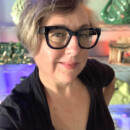Barrie Jean Borich
Nonfiction

- Biography
Biography
Barrie Jean Borich is the author of Apocalypse, Darling (2018), which was short-listed for a Lambda Literary Award. PopMatters said “Apocalypse, Darling soars and seems to live as a new form altogether. It’s poetry, a meditation on life as ‘the other,’ creative nonfiction, and abstract art.” Her memoir Body Geographic (2013) won a Lambda Literary Award in Memoir, and in a starred review Kirkus called the book “…an elegant literary map that celebrates shifting topographies as well as human bodies in motion, not only across water and land, but also through life.” Borich’s previous book, My Lesbian Husband (2000), won the American Library Association Stonewall Book Award. Borich’s essays have appeared most recently in Conjunctions and Ploughshares and have been anthologized in: Isherwood in Transit; Critical Creative Writing; Waveform: Twenty-First Century Essays by Women; and in After Montaigne: Contemporary Essayists Cover the Essays, and have been cited in Best American Essays and Best American Non-Required Reading. She is a professor in the Department of English-MFA/MA in Creative Writing and Publishing Program at DePaul University in Chicago, where she edits Slag Glass City, a journal of the urban essay arts.
Mentor. Workshops and classes in nonfiction.
Statement: “Writing is a process: part thought, part instinct, part wish. Every honest draft holds some glimmer of what your work might become. To write is to try, try, and try again, until we’re stunned to arrive at the revelation of new understanding. Through study of creative nonfiction literary form and strategy we find new ways to uncover meaning and render actuality, which is why I ask students to analyze craft. Yet I no longer believe, as I did when I began teaching over twenty years ago, that my first job is to identify and repair flaws on your draft pages. Editing too soon is futile. Writing is revision. Critique is suggestion. First I help you identify and re-identify the intention, voice and form of your project, and will often suggest you write it again, with one ear keyed to what you know and the other open to ongoing attempt. Write until you’ve surprised yourself; then we’ll attend to the sound, pace, texture, language, image and other points of unfinished beauty.”



Social Media